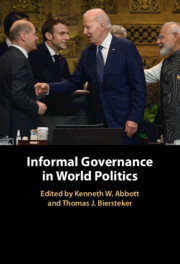Book contents
- Informal Governance in World Politics
- Informal Governance in World Politics
- Copyright page
- Contents
- Figures
- Tables
- Contributors
- Preface
- Acknowledgments
- Abbreviations
- Part I Introduction
- Part II Informality of Institutions
- Part III Informality within Institutions
- Part IV Informality around Institutions
- Part V Normative Issues
- 10 Can Informal Governance Promote Procedural Justice?
- Part VI Conclusion
- References
- Index
10 - Can Informal Governance Promote Procedural Justice?
from Part V - Normative Issues
Published online by Cambridge University Press: 23 May 2024
- Informal Governance in World Politics
- Informal Governance in World Politics
- Copyright page
- Contents
- Figures
- Tables
- Contributors
- Preface
- Acknowledgments
- Abbreviations
- Part I Introduction
- Part II Informality of Institutions
- Part III Informality within Institutions
- Part IV Informality around Institutions
- Part V Normative Issues
- 10 Can Informal Governance Promote Procedural Justice?
- Part VI Conclusion
- References
- Index
Summary
Informal institutions in global governance are generally expected to favor powerful states. According to conventional arguments, procedural justice is best secured through formal institutional rules that constrain power, while informal institutions reinforce power asymmetries. This chapter revisits this position and asks, how and under what conditions can informal institutions enhance the voice and influence of less powerful or marginalized actors in global governance? The chapter argues that while informal institutions are useful to powerful states because they remove constraints to individual action, they can also be useful to less powerful states to the extent that they positively support action through social-integrative effects. Specifically, interactions within informal groups generate two types of social effects – capacity-building and coalition-building – that can enhance the voice of developing countries and increase their control over collective decisions. The chapter illustrates the arguments by profiling informal groups in the global governance of trade and finance.
- Type
- Chapter
- Information
- Informal Governance in World Politics , pp. 243 - 264Publisher: Cambridge University PressPrint publication year: 2024



